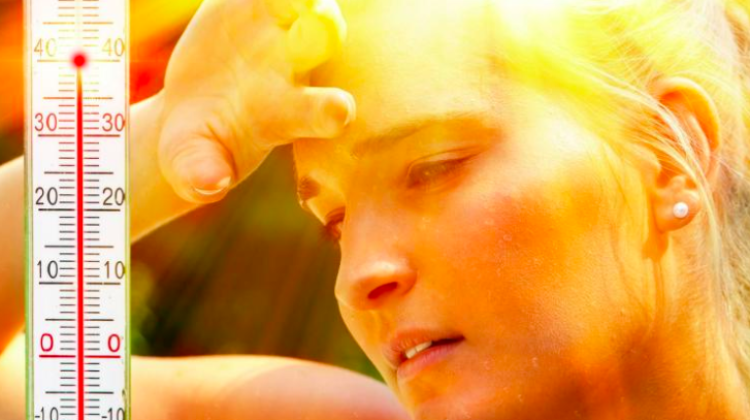#Askscientist: Why does the heat make us tired?
 Photo: Fotolia
Photo: Fotolia
The heat is tiring, because the body puts all its energy into maintaining a constant body temperature. Fatigue, which discourages us from physical effort, protects us against additional elevation of blood temperature and saves valuable micronutrients - says physiologist Prof. Krystyna Koziec.
During the Science Picnic, throughout the day we collected questions that visitors wanted to ask the scientists. Now we ask researchers some of these questions.
With the question "Why does the heat make us tired?" we turned to a physiologist, Prof. Krystyna Koziec from the University of Agriculture in Krakow. She is a lecturer at open conferences devoted to preparing animals for summer heat.
"We are like a hot water bath that needs cold water to cool down. During the heat, all that gets in from the outside is hot or very warm +water+. It is not enough, so the body engages all heat removal mechanisms and we have no more energy for anything else" - explains the researcher. She adds that the smaller the difference between our optimal 37 degrees and the ambient temperature, the harder it is to cool the "bath".
As she explains, we are warm-blooded, which is why our bodies need to produce heat to survive. Digestion of food provides the energy we need to live, including sustaining heat. In this way, the necessary nutrients are delivered to each cell: amino acids building proteins, carbohydrates (mainly glucose), as well as fats. Thanks to the fat components, we can synthesize sex hormones, adrenal hormones, so-called stress hormones, and we get vitamins A, D, E and K.
"Biological combustion in every cell generates thermal energy. When we eat something good, after some time we feel pleasant warmth in our bodies. But this heat is a surplus that the body needs to remove in order to maintain a constant body temperature below 37-38 degrees" - says Prof. Koziec.
When your body receives extra heat from the outside, the surplus grows and the body must remove more heat. The number of heartbeats increases by up to 20 per minute, and your breath become shallow. The body engages its forces, consumes valuable micronutrients, everything we need for normal life processes. The priority is to prevent the blood temperature from rising above the optimum, because that could lead to the death of neurons.
The neutral ambient temperature for a human being is around 21 degrees Celsius. In these conditions, we will comfortably release away excess heat without even noticing it. The difference between internal heat and the ambient temperature is large enough. At 25-28 degrees, we feel weaker. We tire quickly, because the body saves energy and does not allow for physical exertion. It must put all its energy into what is most important - maintaining a constant body temperature.
And what happens when we overheat? The professor warns that even a small change in the temperature of the blood that reaches the brain may threaten the processes that occur in the hypothalamus. This is where our thermoregulation centre is located, which is very sensitive to exceeding the optimal point for each organism.
The physiologist explains that at first the thermoregulation centre will try to raise the temperature of the body, which some will feel as hot flushes. The skin will turn red, sweating will occur. If the internal temperature of a human exceeds 41-42 degrees, changes in neurons will occur. Neurons begin to die, and as a result of a heat shock (heat stroke) you may faint, and without help you will die.
"Remember that animals are much worse off. For cattle, the neutral air temperature is around 12 degrees Celsius. Heat is very difficult for dogs that do not have sweat glands. In their case, the main heat release mechanism is panting and heat excretion with saliva" - explains Prof. Koziec.
She added that even when it is minus 10 degrees Celsius outside, our body secretes around half a litre of sweat every day. We do not realize that because our clothes absorb it. And that`s what happens during a normal "desk" lifestyle, because with physical effort we give away much more water from the body. Breathing out the heat with water vapour also cools us.
"Every physical effort increases the amount of generated heat. Therefore, you must not force yourself to run or do other intensive exercises on hot days. Sodium, potassium and other micro and macroelements are excreted together with human sweat and saliva. Excessive water loss causes problems with circulation and kidney function. Disruption of balance between sodium and potassium can lead to a heart attack"- the researcher says.
So how can you effectively help your body in this extreme effort? According to the physiologist, you should avoid sun exposure and keep cool to prevent heat stroke. You should drink water rich in micronutrients, mainly sodium and potassium, and supplement calcium. After an intensive physical effort, a good tomato juice will certainly help calm the heart and recover when you feel weak - concludes Prof. Koziec.
PAP - Science in Poland, Karolina Duszczyk
kol/ ekr/ kap/
tr. RL
Przed dodaniem komentarza prosimy o zapoznanie z Regulaminem forum serwisu Nauka w Polsce.














